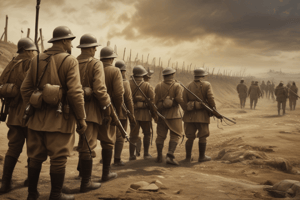Podcast
Questions and Answers
What was the main goal of the initial 8-day bombardment at the Battle of the Somme?
What was the main goal of the initial 8-day bombardment at the Battle of the Somme?
- To break through barbed wire and destroy the German front line. (correct)
- To create a smokescreen for the advancing troops.
- To force the Germans to retreat from their bunkers.
- To test the effectiveness of new artillery.
The initial 8-day bombardment at the Battle of the Somme successfully destroyed the German front lines.
The initial 8-day bombardment at the Battle of the Somme successfully destroyed the German front lines.
False (B)
What type of weapon did the German forces primarily use to defend against the advancing Allied troops at the Battle of the Somme?
What type of weapon did the German forces primarily use to defend against the advancing Allied troops at the Battle of the Somme?
German Maxim Machine Gun
General Earl Haig, a top British military leader, led the British forces at the battle of the ________.
General Earl Haig, a top British military leader, led the British forces at the battle of the ________.
Match the following battle names with their descriptions:
Match the following battle names with their descriptions:
What was one of the main reasons that General Haig was not prepared for the battle of the Somme?
What was one of the main reasons that General Haig was not prepared for the battle of the Somme?
The Canadian forces at Vimy Ridge used the 'creeping barrage' to advance toward German lines.
The Canadian forces at Vimy Ridge used the 'creeping barrage' to advance toward German lines.
Before the Battle of Vimy Ridge, what did the Canadians construct to help with movement?
Before the Battle of Vimy Ridge, what did the Canadians construct to help with movement?
Flashcards
Battle of Somme
Battle of Somme
The Battle of Somme was a major battle fought on the Western Front during World War I, known for its immense casualties and limited territorial gains.
Somme Bombardment
Somme Bombardment
The initial bombardment before the Battle of Somme was intended to destroy German defenses and barbed wire, making it easier for allied troops to advance. However, it failed to achieve its objective, and the Germans were able to wait out the bombardment in underground bunkers.
German Maxim Machine Gun
German Maxim Machine Gun
The German Maxim Machine Gun was a devastating weapon during WWI, firing effectively from bunkers, inflicting heavy causalities on advancing allied troops.
Battle of Vimy Ridge
Battle of Vimy Ridge
Signup and view all the flashcards
Creeping Barrage
Creeping Barrage
Signup and view all the flashcards
Creeping Barrage at Vimy Ridge
Creeping Barrage at Vimy Ridge
Signup and view all the flashcards
Tanks at Somme
Tanks at Somme
Signup and view all the flashcards
Canadian Training for Vimy Ridge
Canadian Training for Vimy Ridge
Signup and view all the flashcards
Study Notes
Battle of Somme
- Initial Bombardment Failure: An eight-day bombardment of German lines failed to significantly damage German defenses. German troops remained underground, waiting for the bombardment to cease and preparing their defenses.
- Haig's Orders and Tactics: General Haig, a British military leader, ordered a direct assault on the German lines. This resulted in substantial Allied casualties as the advancing troops were met with heavy enemy machine gun fire from prepared positions.
- High Casualties (First Day): The first day of the Battle of Somme resulted in 58,000 British casualties.
- Haig's Operational Limitations: General Haig's experience in previous, more mobile conflicts in the Sudan and South Africa didn't adequately prepare him for the static nature of trench warfare on the Western Front, and his cavalry-oriented strategies were ill-suited for the situation.
- Early Tank Deployment: Tanks, a novelty, were first used during the Somme, but early models were unreliable and proved clumsy in the complex battlefield conditions. Only 50 tanks arrived in September.
- Significant Casualties: The strategy of direct assault, combined with the enemy's strong fortifications and machine gun emplacements, resulted in devastating losses for the attacking troops.
Battle of Vimy Ridge
- German Defenses: German forces fortified Vimy Ridge with extensive trench networks, bunkers, and concrete machine gun emplacements, creating strong defensive positions.
- French Failures: Repeated attempts by French forces failed to capture Vimy Ridge, which had been seized by Germany since 1914. French losses amounted to 150,000 casualties in 1915.
- Canadian Strategy: Canadian troops used a "creeping barrage" and pre-battle reconnaissance to achieve exceptional results. Extensive pre-battle preparations, rigorous training, and detailed battle maps were crucial components of their approach.
- Tunneling and Underground Infrastructure: Extensive tunnel and subway systems were developed by the Canadian forces to support their operations.
- Canadian Success: Canadian troops successfully captured the German front line and second-line positions within a short time frame, even against a snowstorm's impact, demonstrating the effectiveness of their strategies.
- Impact on Morale: The Canadian victory at Vimy Ridge boosted international pride and recognition. Major-General Arthur Currie prioritized thorough training and planning.
Studying That Suits You
Use AI to generate personalized quizzes and flashcards to suit your learning preferences.




